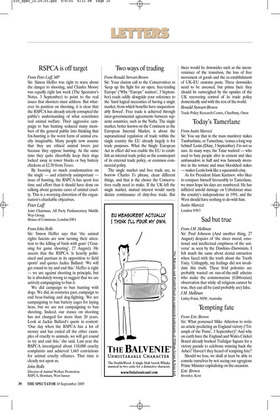Two ways of trading
From Ronald Stewart-Brown Sir: Your clarion call to the Conservatives to ‘keep up the fight for an open, free-trading Europe’ (‘Why “Europe” matters’, 3 September) reads oddly alongside your reference to the ‘hard logical necessities of having a single market, from which benefits have unquestionably flowed’. Free trade is achieved through inter-governmental agreements between separate countries, such as the Nafta. The single market, better known on the Continent as the European Internal Market, is about the supranational regulation of trade within the single country the EU already largely is for trade purposes. What the Single European Act in effect did was enable the EU to establish an internal trade policy as the counterpart of its external trade policy, or common commercial policy.
The single market and free trade are, to borrow Charles I’s phrase, clean different things, and that is the choice the Conservatives really need to make. If the UK left the single market, mutual interest would surely dictate continuance of duty-free trade. But there would be downsides such as the inconvenience of the transition, the loss of free movement of goods and the re-establishment of UK–EU customs posts. These downsides need to be assessed, but prima facie they should be outweighed by the upsides of the UK recovering control of its trade policy domestically and with the rest of the world. Ronald Stewart-Brown
Trade Policy Research Centre, Charlbury, Oxon
























































 Previous page
Previous page